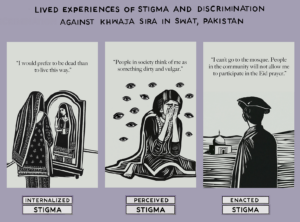The Graduate School of Social Service congratulates Associate Professor Sameena Azhar, Ph.D., whose research was highlighted in the journal Cambridge Prisms Global Mental Health as one of 10 noteworthy articles in its 10th anniversary special collection.
The article, “‘I would prefer to be dead than to live this way’: Lived experiences of stigma and discrimination against khwaja sira in Swat, Pakistan,” was published in April 2024. Co-authors on the study include GSS alumni Maria Mercedes Guzman Herrera, GSS ’23, and Riya Lerner, GSS ’24.

A graphical abstract designed for the article.
Khwaja Sira identify as third-gendered people and have historically suffered social marginalization. However, their lived experiences of stigma and discrimination in the Swat Valley of Khyber Pakhtunkhwa, Pakistan, have unfortunately not been fully studied. Azhar and her team saw this gap in the research and acted.
The authors interviewed 45 khwaja sira in Mingora, Swat, Khyber Pakhtunkhwa to better understand their experiences of gender-nonconformity stigma and discrimination in various social contexts.
The article identified three dimensions of gender-nonconformity stigma impacting khwaja sira in Swat, Pakistan:
- Internalized stigma – namely feelings of shame and embarrassment
- Perceived stigma – namely opinions others had of khwaja sira regarding lack of employability or engagement in sex work
- Enacted stigma – namely exclusion from families, in educational settings, in religious spaces, and in healthcare settings.
Azhar and her team hope their findings will inform future social intervention and community practice engagements with khwaja sira communities in Pakistan.


